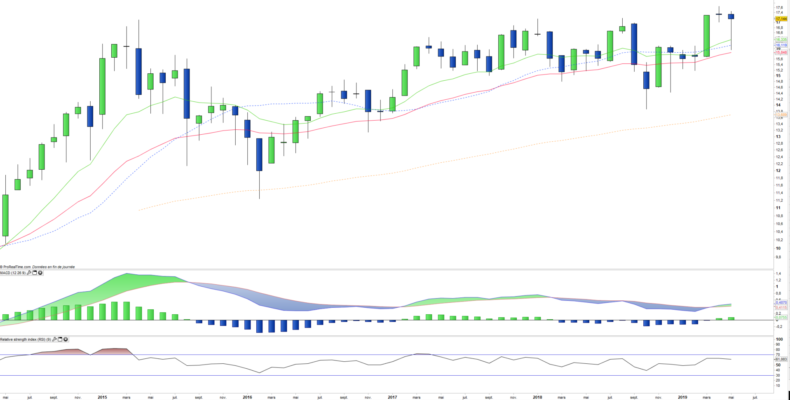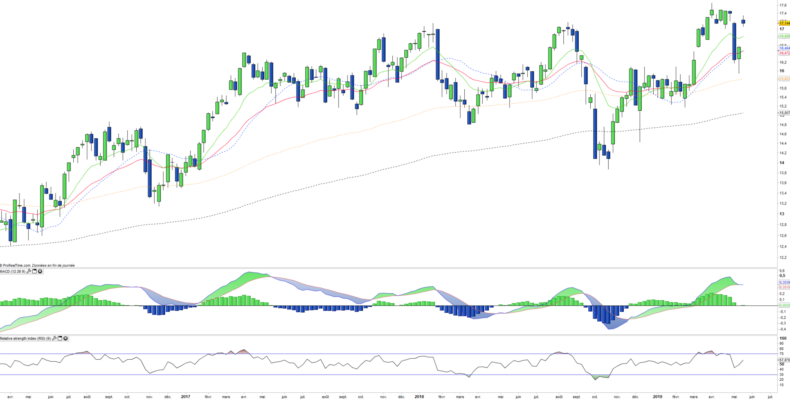Lyxor MSCI India (INR) - 22/05/19
Short Term trend: Positive (90/100)
Long Term trend: Positive (100/100)
(scores computed by our proprietary algorithms)
Characteristics of the ETF
The INR ETF (Lyxor UCITS), created in 10/2006 and quoted in Euro on Euronext replicates the MSCI Net Emerging Market India index and represents 85% of the total market capitalization of India. Although the index that is replicated is listed in USD, it is composed of 78 Indian values, which implies an exposure to the local currency, the Indian rupee.
The ETF costs are in the upper part of our sample and stand at 0.85% while AUM amount to € 1015m. The replication method is indirect (via a swap) and there is a dividend capitalization policy.
Alternative ETFs: INDA (Ishares in USD), CI2 (Amundi in Euro)
Index & components
The interest of the INR tracker is twofold, it allows in the first place to bet on the most dynamic and promising emerging economy of the world while the important sectoral diversification ensures a very satisfactory coverage of the Indian economy with a high proportion of 'growth companies.
The significant share of the technology sector (18%) - which includes Infosys in particular in the index - seems to us an asset with regard to the quality of the IT / Software sector in India with leading players.
The index also seems well balanced in terms of sectors, with 25% for financials, and 16% for energy, the share of the industry tends to increase with 8% for materials and 11% for durable goods. India's GDP reached $ 2620bn in 2018 (the fifth place just in front of France) while the country began catching up on China, with the advantage of being the largest democracy in the world (1.5bn people) with a positioning on the advanced sectors.
The rise of infrastructure and foreign investment should contribute to the country's industrial take-off as well as ambitious tax reforms such as the "single VAT", which aims to harmonize the taxation of a country where, until recently, the 29 States each applied their own regime, should have a positive impact in the medium term.
The performance of INR since the beginning of the year is 8.1% after a fall of -4.8% in 2018 and an increase of + 20.8% in 2017 which corresponded to the rebound of the index after the shock related to the reforms on the demonetisation in 2016.
The performance of the index is often inversely correlated with oil prices, due to India's high energy dependence, which forces it to import almost all of its energy needs. The re-election of Mr Modi is good news for the markets who see the continuity of ongoing reforms, and should support the rise in the index in the coming weeks.
Technical Analysis
Monthly data analysis
The monthly chart shows a long-term trend that is broadly bullish and less and less erratic. The index is about to set new historical highs while retracements are weakening, forming a "bullish catapult". The upward crossing of the MACD, which is also positioned well above the zero line, is a positive factor. The crossing of the great resistance of € 17 seems imminent and should release a significant upside potential in the medium / long term.
Weekly data analysis
On the weekly chart, we can observe the strong upward reaction of the index (elections) which repositions it on the major resistance of € 17. By dint of being tested it should eventually give way, especially as technical oscillators show no sign of overbought in the short term. The most likely scenario is a bullish break-out of the of resistance and the achievement of historical highs in the short term.
Theme
INR is a UCITS ETF, listed in EUR, which seeks to replicate the MSCI Emerging Markets India Net TR index (78 indian companies)
Characteristics
| Inception date | 25/10/2006 |
| Expense ratio | 0,85% |
| Benchmark | MSCI Emerging Markets India Net TR |
| Ticker | INR |
| Issuer | Lyxor |
| UCITS | Yes |
| EU-SD Status | Out of scope |
| Currency | € |
| Exchange | Euronext Paris |
| Assets Under Management | 1 015 M€ |
| Dividends | Capitalization |
| PEA (France) | No |
| SRD (France) | Yes |
| Currency risk | Yes |
| Number of Holdings | 78 |
| Risk | 4/5 |
Country breakdown
| India | 100% |
Sector Breakdown
| Financials | 25% |
| Information Technology | 18% |
| Energy | 16% |
| Consumer staples | 10% |
| Materials | 8% |
| Consumer discretionary | 7% |
| Health Care | 5% |
| Others | 11% |
Top Ten Holdings
| Reliance Industries | 12% |
| Housing development finance | 9% |
| Infosys | 8% |
| Tata Consultancy | 5% |
| Axis Bank | 4% |
| Hindustan Unilever | 3% |
| ITC | 3% |
| ICICI | 3% |
| Maruti Suzuki India | 2% |
| Larsen & Toubro | 2% |


